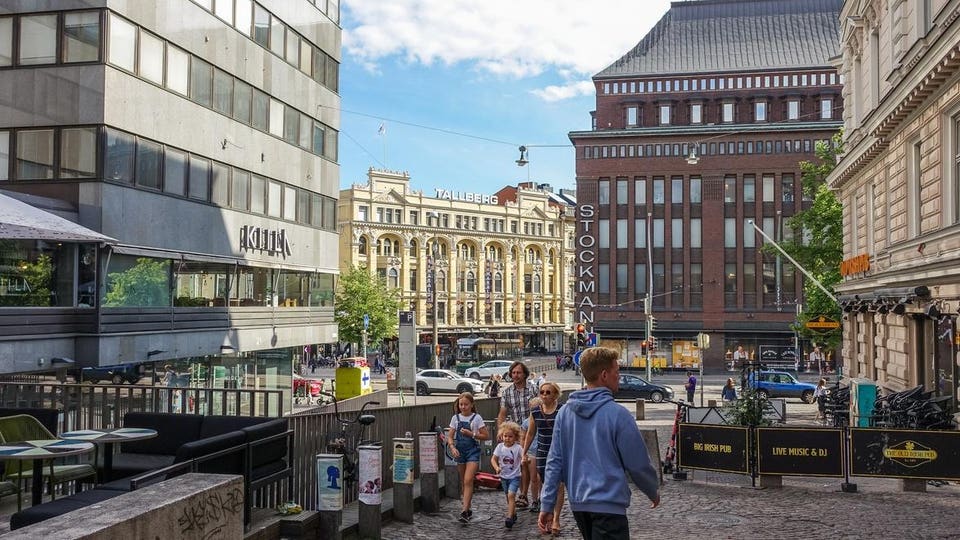Forbes Business Retail Shopping Slump And Second-Hand Craze In Finland Linked To Financial Constraints, Not Eco-Consciousness Dennis Mitzner Contributor Opinions expressed by Forbes Contributors are their own. I’m interested in how technology shapes culture and behavior. Following Oct 2, 2023, 06:52am EDT | Press play to listen to this article! Got it! Share to Facebook Share to Twitter Share to Linkedin Finland’s online retail sector is grappling with a significant downturn, driven not so much by eco-conscious shopping trends, but rather by harsh economic realities.
Rising inflation, coupled with surging interest rates, has squeezed consumer purchasing power, prompting a notable decrease in online sales. Soaring living costs have led to diminishing disposable incomes, compelling consumers to adopt a more cautious approach to their spending habits. As a result, they are prioritizing essential purchases while becoming increasingly hesitant about discretionary expenses.
Finland’s online retail market has taken a hit, with data indicating a remarkable 24% decline in online sales during the second quarter of 2022 compared to the previous year. Even though Finland tops the list of the most sustainable shoppers in the EU , the economic downturn has reshaped consumer behavior, emphasizing financial stability over sustainability in the purchasing decisions of Finnish shoppers. Second-hand shops signal economic woes In Finland, the sale of used clothing has been growing significantly faster than the rest of the clothing retail industry.
For instance, in the period from January to June 2023, its value increased by 19% compared to the same period last year, while during the same timeframe, the entire clothing retail sector grew only by about five percent. In Southern Finland, many shopping centers have also seen the opening of second-hand stores selling used clothing. What is believed to be the world’s inaugural second-hand store operating within an airport has recently opened at Helsinki-Vantaa Airport.
Noora Hautakangas, the owner of the Relove store, reports a strong initial performance in the first few weeks since opening. The trend of second-hand shopping has extended beyond airports, making its way into shopping centers, where cozy second-hand stores have become a prominent feature alongside stores selling new products. For instance, the Helsinki Metropolitan Reuse Center has established a presence in malls like Redi in Helsinki, and there are plans to open a new store in the city of Espoo’s Iso Omena.
This shift reflects changing perceptions of used clothing, making it increasingly mainstream and contributing to its growth in popularity. Several Finnish sustainable fashion brands are facing challenging times. Arela and Nudge have recently announced closures, while Kässäkerho Pom Pom and Myssyfarmi, small-scale producers of yarn and handmade knits, have reached out to their customers for urgent support.
MORE FOR YOU Spooked Russians Welded Six-Foot-Tall Drone Armor On A 64-Year-Old T-54B Tank AEW WrestleDream 2023 Results: Winners And Grades As Edge Debuts Elon Musk Posts Meme Ridiculing U. S. Aid To Ukraine In a recent interview , Maija Arela, the founder and CEO of Arela, known for its cashmere knits, highlights the past few years’ hardships, including the impact of the COVID-19 pandemic, the conflict in Ukraine, and the energy crisis.
While initially, Finnish consumers showed support for local brands during the pandemic, the subsequent economic challenges have led to a significant drop in purchases. Industry experts suggest that consumers are now reevaluating lifestyle purchases differently, with price sensitivity playing a more prominent role. Sustainability, once a distinguishing factor, is now commonplace among fashion brands, intensifying competition.
Finnish consumers, compared to their counterparts in other countries, tend to prioritize affordability. To navigate these difficulties, small Finnish businesses are advised to explore international markets where more affluent customers may be willing to pay for quality. Steep decline in online shopping Finnish online retailers are grappling with a sharp decline in sales as inflation and rising interest rates have reduced consumers’ disposable income.
The domestic e-commerce market has seen a substantial drop in sales , with a 24% decrease compared to the same period the previous year from April to June. This downturn is a stark contrast to the surge in Finnish online shopping during the pandemic. It’s worth noting that not only online sales, but retail in general is affected by the waning purchasing power of consumers, making it evident that Finnish consumer buying power is currently in crisis.
Markku Korkiakoski, CEO of Vilkas Group, a company that provides e-commerce services and collects data from around two thousand of its e-commerce clients, says that Finnish consumer spending is now more focused on essential purchases, as rising prices and interest rates have left many households with less money at the end of the month. This shift in consumer behavior has had a significant impact on domestic e-commerce, resulting in a drop in sales. The situation has evolved rapidly, and many are living paycheck to paycheck, second-guessing even essential purchases.
Korkiakoski estimates that the Finnish e-commerce sector has lost as much as three billion euros in sales, potentially leading to a one-billion-euro reduction in tax revenue for the state. The ongoing uncertainty, waning purchasing power, and rising interest rates have made consumers cautious in their online shopping habits, leading to a further decline in sales. Harri Jaskari, the Director of Suomen Yrittäjät, an interest and service organization for small and medium-sized enterprises, says the situation is grave.
“We need to respond to the dwindling purchasing power in Finland. Both businesses and the entire country need to think in new ways. With digitalization, exports can be seen as international trade without the need for cumbersome organizations.
. . Finland can export more than just technology.
There are significant opportunities in data-driven economics and online commerce, and promising examples already exist. ” Follow me on Twitter or LinkedIn . Check out my website or some of my other work here .
Dennis Mitzner Editorial Standards Print Reprints & Permissions.
From: forbescrypto
URL: https://www.forbes.com/sites/dennismitzner/2023/10/02/shopping-slump-and-second-hand-craze-in-finland-linked-to-financial-constraints-not-eco-consciousness/



